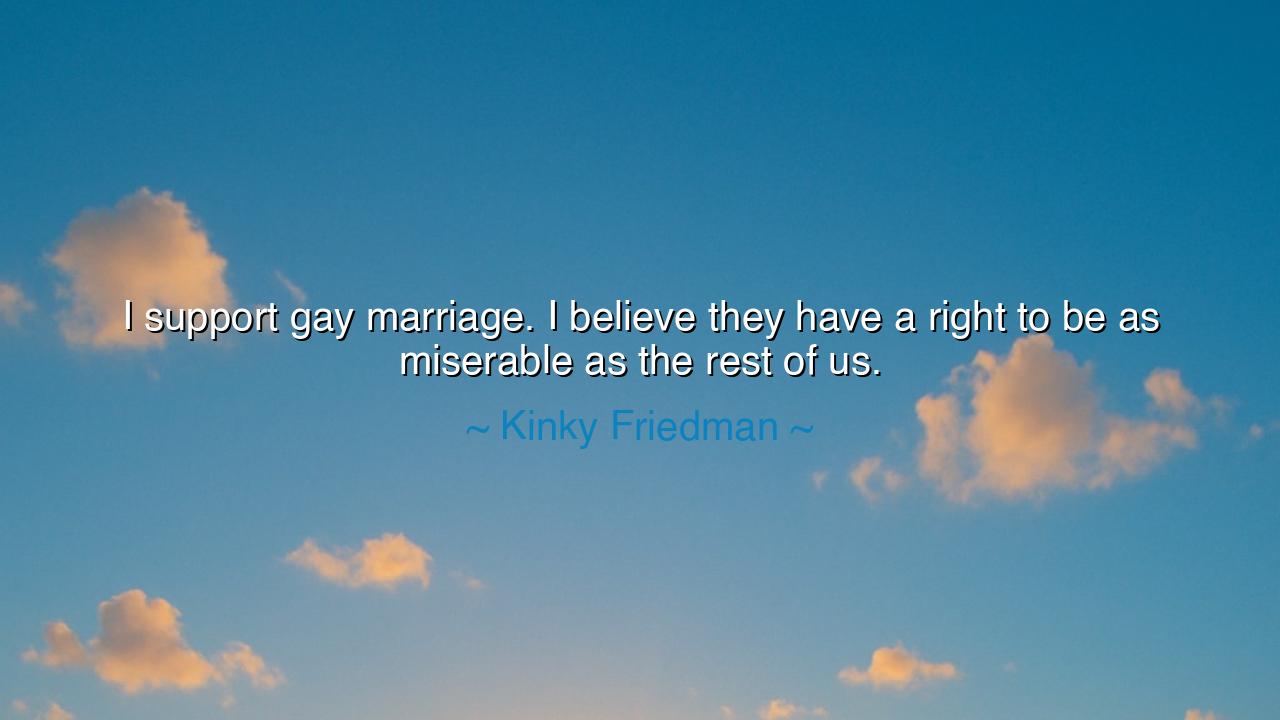
I support gay marriage. I believe they have a right to be as
I support gay marriage. I believe they have a right to be as miserable as the rest of us.






The words of Kinky Friedman, “I support gay marriage. I believe they have a right to be as miserable as the rest of us,” are wrapped in humor but forged from wisdom. On the surface, they are a jest — the kind of sharp wit for which Friedman, a musician, novelist, and political satirist, is famous. Yet beneath the laughter lies a truth as ancient as humanity itself: that equality is not the right to joy alone, but the right to experience the full measure of life — its delights, its sorrows, and its trials — without restriction. Through irony, Friedman delivers a lesson the prophets and philosophers of old would have understood: that justice is not granting privilege, but sharing burden; not conferring happiness, but restoring dignity.
To grasp the meaning of his humor, one must first see the world it reflects. For centuries, those who loved differently — those whose hearts did not conform to the narrow molds of tradition — were denied the very institutions others took for granted. Marriage, the sacred bond recognized by society and law, was withheld from them, as though love itself were a privilege of the few. When Friedman speaks of “the right to be as miserable as the rest of us,” he exposes the absurdity of such exclusion. He reminds us that to be human is to struggle, to falter, and to endure — and that denying anyone that shared experience is to deny them their humanity. His jest cuts like the blade of a philosopher: behind the laughter lies the equality of suffering, the democracy of imperfection.
In the tone of the ancients, this might be likened to the teaching of Diogenes, the Cynic, who mocked the hypocrisies of Athens not with anger, but with irony. Diogenes would walk through the streets with a lantern at noon, saying he sought an honest man — not because he did not believe in honesty, but because society claimed virtue while practicing vanity. So too does Kinky Friedman, with his dry humor, expose the contradiction of a world that praises freedom while denying it to others. His words remind us that laughter can be the highest form of truth-telling — for when truth is too bitter to swallow, humor makes it bearable.
There is also humility in his mockery. By calling marriage a “miserable” thing, he does not demean love; he humanizes it. He strips away the illusion of perfection that so often surrounds it. Marriage, he suggests, is not eternal bliss but the shared struggle of two imperfect beings who promise to endure together. In this light, equality in marriage means equality in imperfection — the right to experience frustration, compromise, misunderstanding, and endurance like everyone else. His jest becomes almost sacred, for it affirms that to be equal is not to be idealized or idolized, but to be fully, authentically human.
Consider the long struggle for marriage equality across the world. In 2015, when the United States Supreme Court declared same-sex marriage a constitutional right, the streets filled not only with joy but with relief — relief that love no longer needed permission to exist. Many wept; others laughed through their tears. It was a laughter much like Friedman’s — the laughter of those who had waited too long for something so simple, so ordinary, that it should never have been denied. His words capture that spirit perfectly: the victory was not about being different, but about being ordinary at last — free to marry, to divorce, to argue, to age, and to live like anyone else.
Beneath the humor, then, is a profound compassion. Friedman’s irony reminds us that equality is not the demand for privilege, but the plea for shared humanity. It is a call to the heart of society: Let us all walk the same roads, face the same hardships, and build the same homes under the same laws. The ancients would have called this the justice of balance — the idea that harmony is not achieved through uniformity, but through fairness. Equality means that every soul, regardless of whom it loves, should stand equal before the joys and burdens of life.
Let this be the lesson of Kinky Friedman’s laughter: that truth often hides in jest, and that equality is not merely a law to be written, but an attitude to be lived. When you hear humor that pierces the veil of hypocrisy, do not dismiss it as mere mockery; listen for the truth it reveals. And in your own life, defend the right of every person — not just to be happy, but to be human. For only when all are free to share equally in life’s joys and its miseries will the world know true justice. Thus, behind Friedman’s grin lies a timeless teaching: that love, with all its burdens, belongs to all — and that to deny it to one is to diminish the humanity of us all.






AAdministratorAdministrator
Welcome, honored guests. Please leave a comment, we will respond soon